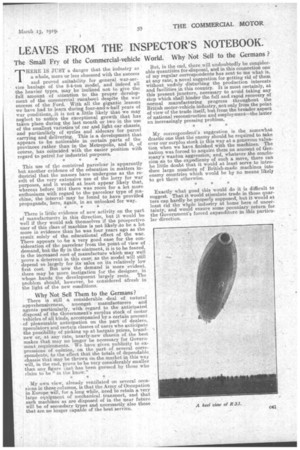LEAVES FROM THE INSPECTOR'S NOTEBOOK.
Page 15

If you've noticed an error in this article please click here to report it so we can fix it.
The Small Fry of the Commercial-vehicle World. Why Not Sell to the Germans ?
THERE IS JUST a danger that the industry as a whole, more or less obsessed with the success and proved •suitability for general war-service haulage of the 3-4-ton model, and indeed all the heavier types, may be inclined not to give the full amount of attention to the proper development of the commercial runabout despite the war success of the Ford. With all the gigantic lessons we have had to learn during four-and.-a-half years of war conditions._it is not a little likely that we may neglect to notice the exceptional growth that has taken place during the last month or two in the use of the smallest varieties of car a,n4:1 light car chassis, and particularly of cycles and sidecars for parcel carrying and delivering. This is a development that appears to be noticeable in certain parts of the provinces rather than in the Metropolis, and it, of course, has coincided with the easier position with regard to petrol for industrial purposes.
This use of the contrived parcekar is apparently but another evidence of the education in matters industrial that the masses have undergone as the result of the very extensive use of the lorry for war purposes' and it would at least appear likely that, whereas before 1914 there was room for a lot more enthusiasm with regard to the pa-rcelcar type of machine, the interval may be found to have provided propaganda., here, again, in an unlooked for way.
There is little evidence of new activity on the part of manufacturers in this direction, but it would be well if they would ask themselves if the prospective user of this class of machine is not likely ,to be a lot more in evidence than he was four years ago as the result solely of the educational effect of the war. There appears to be a very good case for the consideration of the parcelcar from the point of view of demand, but the fly in the ointment, it is to be feared. is the increased cost of manufacture which may well prove a deterrent in this case, as the model will still depend so largely for its sales on its relatively low first cost. But now the demand is more evident, there may be more instigation for the designer, in whose hands the development largely rests. The problem should, however, be considered afresh in the light of the new conditions.
Why Not Sell Them to the Germans?
There is still a considerable deal of natural apprehensiveness amongst manufacturers and agents particularly, with regard to the anticipated disposal of the Government's surplus stock of motor vehicles of all kinds, accompanied by a certain amount of pleasurable anticipation on the part of dealers, speculators and certain classes of users who anticipate the possibility of picking up at bargain prices, brandnew or, at any rate, nearly-new chassis of the best makes that may no longer be necessary for Government requirements. We have given publicity to expressions of opinion, on the part of several correspondents, to the effect that the totals of dependable chassis that may be thrown on the market in this way will, in the end, prove to be very considerably smaller than any figure that has been guessed by those who claim to be "in the know."
My own view, already ventilated on several occasions in these columns, is that the Army of Occupation in Europe will, for a long while, need to retain a very large equipment of mechanical transport, and that such machines as are disposed of in the near future will be of secondary types and necessarily also those that are no longer capable of the best service. But, in the end, there will undoubtedly be coneklerable quantities fordisposal, and in this connection one of my regular correspondents has sent to me what is, at any rate, a novel suggestion for getting rid of them without unduly disturbing the production interests and facilities in this country. It is most certainly, at this present juncture, necessary to avoid taking any step which shall hinder the full and rapid recovery of normal manufacturing progress throughout the British motor-vehicle industry, not only from the point of view of the trade itself, but from the broader aspect of national reconstruction and employment—the latter an increasingly pressing problem.
My correspondent's suggestion is the somewhat drastic one that the enemy should be required to take over our surplus stock in this way at a generous valuation when we have finished with the machines. The nation was forced to acquire them on account of Germany's. wanton aggression, and, whatever the conclusion as to the expediency of such a, move, there can be little doubt that it would at least serve to introduce large numbers of British-made machines into enemy countries which would be by no means likely to get there otherwise.
Exactly what good this would do it is difficult to suggest. That it would stimulate trade in those quarters can hardly be properly supposed, but it would at least rid the whele industry at home here of uncertainty, and would ensure some pecuniary return for the Government's forced expenditure in this particular direction.






















